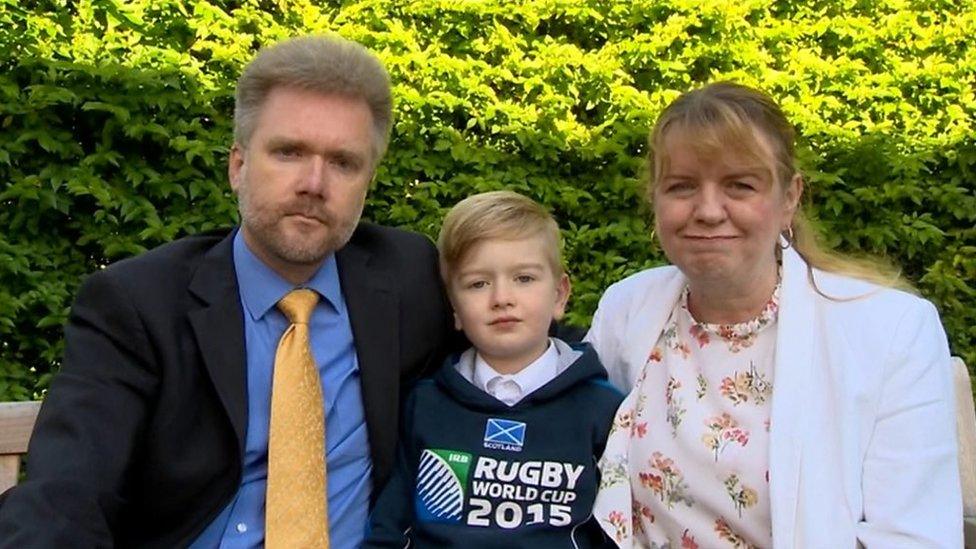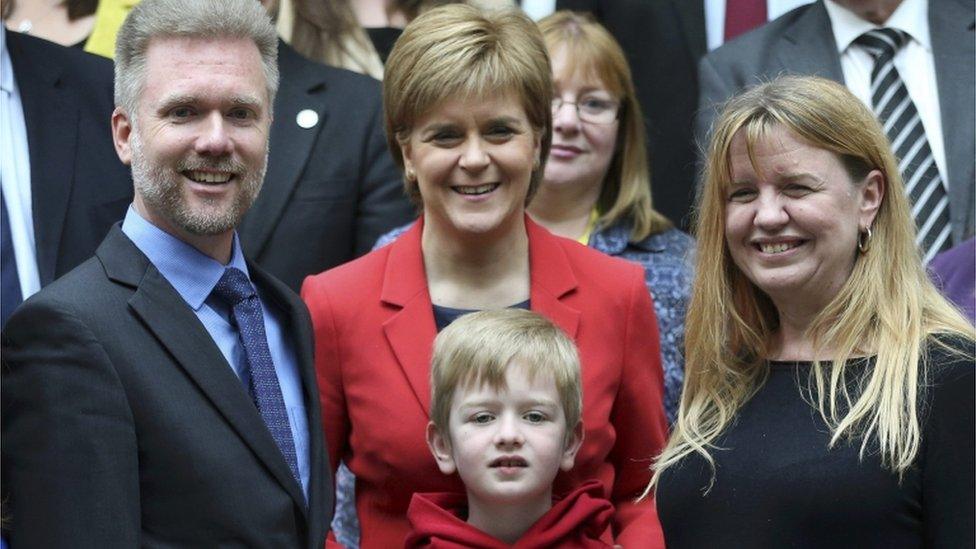Australian family facing deportation given job offer hope
- Published

The Brain family have lived in the Scottish Highlands since 2011
An Australian family facing deportation from the UK say they have been given hope of a job offer which could potentially keep them in the country.
Gregg and Kathryn Brain and their son, who live in Dingwall in the the Highlands, failed to meet a deadline on Monday to qualify for a new visa.
Immigration minister Robert Goodwill has urged them to leave the country.
But Mr Brain said a "major Scottish company" had been in touch with a possible job offer.
He told the BBC that the potential job offer had given the family "cautious optimism", and that he expected to hear more details later on Wednesday.
Mr Brain said: "We have had a contact from a major Scottish employer this morning, or at least from the office.
"The CEO we understand will be calling us this afternoon. We don't know what the job offer is, we don't know whether it would fit visa requirements."
Mrs Brain had previously been offered a job by a distillery company, but the offer was subsequently withdrawn because it would not meet the Home Office requirements.
Mr Goodwill had earlier now ruled there were no exceptional circumstances that would justify allowing the family to stay in the UK.
He said the family would now be contacted by Immigration Enforcement.
The minister said if the family did not co-operate it could lead to them not being allowed to return to the UK at a later date.

First Minister Nicola Sturgeon is among those to have supported the family's campaign to remain in the UK
The Brains moved to Scotland in 2011 on Mrs Brain's student visa.
They have said that they expected to be able to later move on to a Tier 1 post-study work visa, but the scheme was scrapped in 2012.
In a letter to the family and SNP MP Ian Blackford, who has been campaigning on their behalf, Mr Goodwill said the announcement that the scheme was going to be abolished was made three months before the Brains arrived in Scotland.
Although the family said they were unaware of the announcement until 2012, they have still had a number of years in which to search and apply for jobs which would qualify under Tier 2, Mr Goodwill added.
The minister insisted there was therefore "no breach of faith" in relation to the closure of the Post-Study Work route.
'Three extensions'
He added: "It was not an entitlement of the student visa Kathryn Brain originally applied for, which was for a time-limited period of study only.
"The Tier 1 (Post-Study Work) category was closed because too many applicants were not using the student route primarily to gain a world-class education at our universities, but merely as a means to the end of living and working in the UK.
"Even when the route was open, applicants needed to find a job that would qualify under Tier 2 before the end of the two years in the route.
"I regret that that has not yet happened, despite having had since 2012, nearly a year having passed since Kathryn finished her studies and the three extensions that have been granted to the family on an exceptional basis."
He said there was therefore "no fundamental difference between their circumstances and that of any other individuals who came to the UK on a temporary study visa and there are no exceptional considerations which would justify granting them leave outside the Immigration Rules."

Brain family timeline
2010: Kathryn Brain is granted a student visa with husband and son as dependants. She intends to later move onto post-study work visa
March 2011: Announcement of cancellation of post-study work visa
June 2011: Brains arrive in Scotland
2012: Post-study work visa scrapped. Brains say they became aware of this just months before the change
May 2015: Mrs Brain applies for leave to remain under tier 4 (student) visa. Granted till December
December 2015: Family makes application for leave to remain made under article 8 of the European convention on human rights, the right to a family life. Refused in March
April 2016: Immigration Minister James Brokenshire extends family's "grace period" to remain in UK until 11 May. It is later extended until the end of May
30 May 2016: Family given new deadline of 1 August 2016

Mr Goodwill also dismissed suggestions by the Brains and Mr Blackford that the family was being denied access to what they have claimed is a scheme similar to the post-work visa that is being piloted at four English universities.
He said the pilot extended the leave period following the end of their study to six months, rather than the usual two or four months, but pointed out that Mrs Brain had already had "significantly longer" than six months after the end of her course in which to find work that would qualify her for a visa.
Mr Goodwill said the Brain case would now be handled by the Family Returns Unit of Immigration Enforcement, who would contact the family later this week to begin discussions with them regarding a voluntary departure to Australia.
He urged Mr Blackford to encourage the family to co-operate with the process and leave the UK voluntarily.
Failure to do so would lead to an "adverse immigration history" which could preclude the family making a future Tier 2 job application or even returning to the UK as visitors, the minister warned.
'No compassion'
Responding to the letter, Mr Blackford said he was "astonished with the callous disregard to the interests of the Brain family", who he said had been given the support of the local community and the Scottish government.
He added: "The minister states the government had a commitment to reduce net migration, the Brains are to leave so the government can trumpet it is being tough on immigration.
"There is no compassion, there is consideration that we are dealing with real people not just numbers on an immigration count."
A spokeswoman for the Scottish government said it was "deeply disappointed that the UK government does not recognise the family's contribution to the community and is unwilling to consider extending their stay."
She added: "The Brains are one of many cases where people who can make a valuable contribution to Scotland's economy and society are let down by the ever tightening UK immigration rules, further demonstrating that this is a system which is not fit for Scotland's needs."